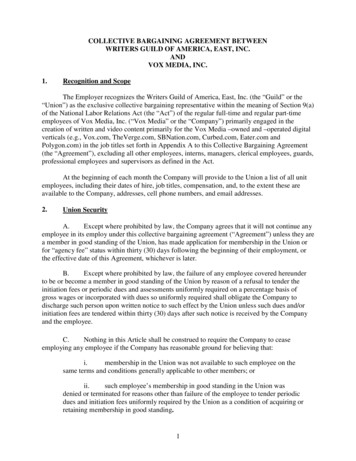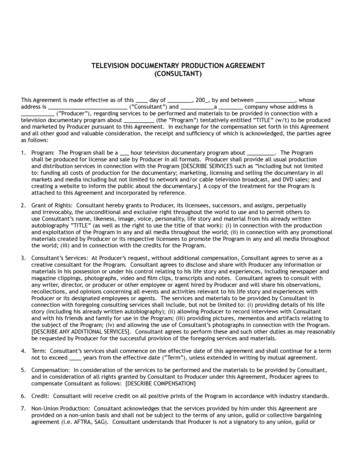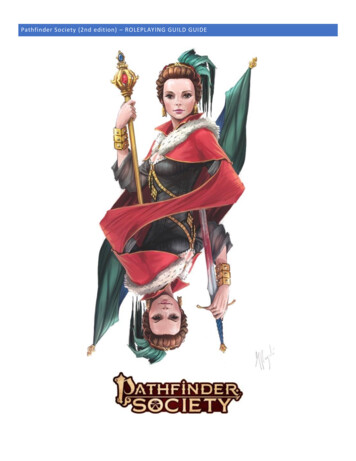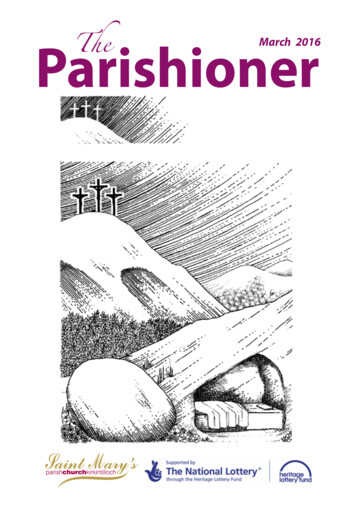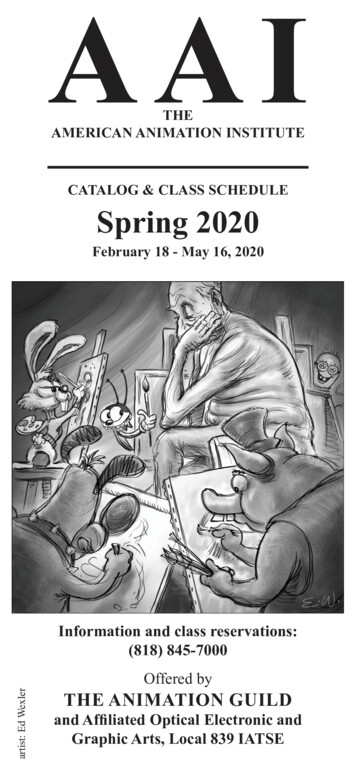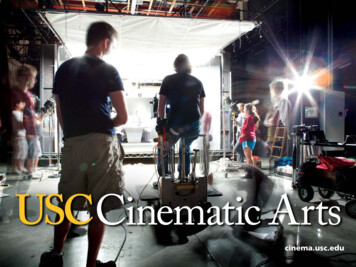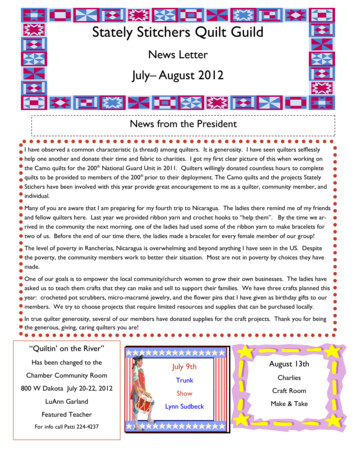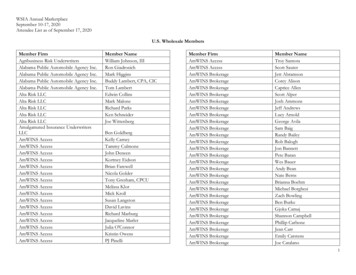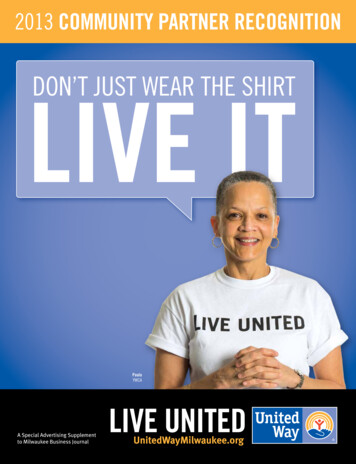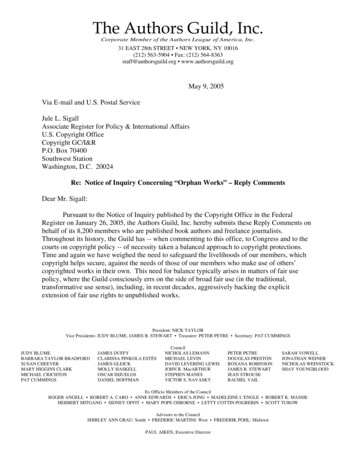
Transcription
The Authors Guild, Inc.Corporate Member of the Authors League of America, Inc.31 EAST 28th STREET NEW YORK, NY 10016(212) 563-5904 Fax: (212) 564-8363staff@authorsguild.org www.authorsguild.orgMay 9, 2005Via E-mail and U.S. Postal ServiceJule L. SigallAssociate Register for Policy & International AffairsU.S. Copyright OfficeCopyright GC/I&RP.O. Box 70400Southwest StationWashington, D.C. 20024Re: Notice of Inquiry Concerning “Orphan Works” – Reply CommentsDear Mr. Sigall:Pursuant to the Notice of Inquiry published by the Copyright Office in the FederalRegister on January 26, 2005, the Authors Guild, Inc. hereby submits these Reply Comments onbehalf of its 8,200 members who are published book authors and freelance journalists.Throughout its history, the Guild has -- when commenting to this office, to Congress and to thecourts on copyright policy -- of necessity taken a balanced approach to copyright protections.Time and again we have weighed the need to safeguard the livelihoods of our members, whichcopyright helps secure, against the needs of those of our members who make use of others’copyrighted works in their own. This need for balance typically arises in matters of fair usepolicy, where the Guild consciously errs on the side of broad fair use (in the traditional,transformative use sense), including, in recent decades, aggressively backing the explicitextension of fair use rights to unpublished works.President: NICK TAYLORVice Presidents: JUDY BLUME, JAMES B. STEWART Treasurer: PETER PETRE Secretary: PAT CUMMINGSJUDY BLUMEBARBARA TAYLOR BRADFORDSUSAN CHEEVERMARY HIGGINS CLARKMICHAEL CRICHTONPAT CUMMINGSJAMES DUFFYCLARISSA PINKOLA ESTÈSJAMES GLEICKMOLLY HASKELLOSCAR HIJUELOSDANIEL HOFFMANCouncilNICHOLAS LEMANNMICHAEL LEVINDAVID LEVERING LEWISJOHN R. MacARTHURSTEPHEN MANESVICTOR S. NAVASKYPETER PETREDOUGLAS PRESTONROXANA ROBINSONJAMES B. STEWARTJEAN STROUSERACHEL VAILSARAH VOWELLJONATHAN WEINERNICHOLAS WEINSTOCKSHAY YOUNGBLOODEx Officio Members of the CouncilROGER ANGELL ROBERT A. CARO ANNE EDWARDS ERICA JONG MADELEINE L’ENGLE ROBERT K. MASSIEHERBERT MITGANG SIDNEY OFFIT MARY POPE OSBORNE LETTY COTTIN POGREBIN SCOTT TUROWAdvisors to the CouncilSHIRLEY ANN GRAU: South FREDERIC MARTINI: West FREDERIK POHL: MidwestPAUL AIKEN, Executive Director
Jule L. Sigall, Esq.May 9, 2005Page 2The Authors Guild, Inc.Mindful of this need for balance, we submit these Reply Comments to make five majorpoints:1. While orphan works present a problem to some authors, the impact of the problem onfree expression and our culture appears to have been overstated by some commenters.The overwhelming majority of published writers -- 85% -- have “never” or “rarely”failed to reach a rightsholder to request permission, according to our recent CopyrightPermissions Survey, a two-part survey to which more than 2,100 published writersresponded.1 We further discuss the striking results of this survey below, and providedetailed results to the more extensive Phase II of this survey in the appendix.2. Although the problem of orphan works might be relatively small with respect to thecreation of new literary works, it is certainly not insignificant. Two-thirds ofrespondents to the Copyright Permissions Survey who had asked for copyrightpermissions in the course of their writing careers believed that finding some means ofallowing them to use orphan works would appreciably ease their work as writers.2The Authors Guild largely agrees with several commenters’ proposals to limit thelegal liability of users of orphan works who demonstrate they made a diligent searchfor the rightsholders before using the works.3. This limitation on liability and the scope of permitted uses after a diligent search forthe rightsholder have to be crafted with extreme care, so they do not, in effect,amount to forfeiture of copyright. Moreover, for uses for which there is nomeaningful compensation – for example, for online digital archives of works –injunctive relief must be available as an alternative to accepting a nominal licensefee. A rightsholder who is temporarily unfindable by a particular method of diligentsearch should not face the penalty of having her work consigned to the quasi-publicdomain of such archives, which may well drain the work of all other licensing value.The prospect of such injunctive relief, fortunately, should not be daunting for thetruly diligent compiler of a digital archive: instances of emergent rightsholders will berare. Emergent rightsholders would not have a substantial affect on the value of thearchive.4. We urge the Copyright Office to establish a publicly available, searchable database inwhich users of orphan works would need to file a simple form affirming that theymade a diligent search for the rightsholder and describing the steps they took to locatethe rightsholder. Such a database woulda. Help keep users honest, since they would know that their affirmations ofdiligence would be on public display, easily accessible to the rightsholdersthey assert are unfindable.1Authors Guild Survey of Copyright Permission Practices, conducted in April and May 2005. More than 2,100published writers completed Phase I of the survey, and more than 1,200 published writers completed Phase II, thesubsequent, far more extensive part of the survey. Some identical questions were asked in the two parts. 85% ofrespondents to Phase I reported “never” or “rarely” failed to reach a rightsholder; the figure was 89% of respondentsto Phase II. Appendix, Q4-01.2Appendix, Q6-01.
The Authors Guild, Inc.Jule L. Sigall, Esq.May 9, 2005Page 3b. Help identify abusers of the system. A user who failed to make a diligentsearch in one instance may well be a repeat offender.c. Help establish useful means of reaching rightsholders.d. Help guide the Copyright Office in establishing any new regulations withrespect to the use of orphan works.The Guild strongly opposes, however, the right of any user to piggyback another’saffirmation of diligence. Affirmations of others’ diligence should be no evidence ofthe particular user’s diligence; distinct users should be responsible for their own,independent diligent search for rightsholders.5. The law should not establish artificial licensing schemes.The Authors Guild is ready and eager to provide the Copyright Office with any furtherassistance it can as it addresses the issue of orphan works.Interests of the Authors GuildFounded in 1912 as the Authors League of America, the Authors Guild is the nation’slargest and oldest organization of published authors. Our membership includes journalists,historians, biographers, novelists, poets, children’s book authors, academic and textbook authors.66% of our membership writes nonfiction books, 40% are freelance journalists, and 44% write ortranslate fiction, poetry or drama (many members write in more than one of these categories).The Authors Guild’s mission is to promote the professional interests of authors in variousareas, especially copyright, freedom of expression and publishing contracts. In the area ofcopyright, the Guild has worked for appropriate domestic and international copyright protectionand to secure fair financial and non-monetary compensation for authors’ valuable work. Guildattorneys annually advise hundreds of members about their (and their publishers’) legalobligations, including those arising out of their publishing contracts.In pursuit of this mission, the Guild co-founded and along with other writersorganizations participates in the Authors Registry, a database of approximately 30,000 publishedand unpublished writers. As a payment agent for secondary rights royalties, the Registry hasdistributed more than 3.5 million to writers in its ten years. Annually, it conveys thousands ofpermissions requests to registrants.The Authors Guild appreciates that the Copyright Office seeks to address the issue of“orphan works” as defined in its Notice of Inquiry.3 In trade, business and academic publishing,writers typically have to warrant to their licensees that they have secured the necessary legalpermissions to use others’ copyrighted works in their manuscripts. If an author’s publisher is3We confine these remarks to the issue of “orphan works” as defined in the Notice of Inquiry. We strongly opposeany attempt to amend the law to diminish protection for works that are not orphan works, which would threaten thebasic tenets of copyright and clearly breach our international treaty obligations.
Jule L. Sigall, Esq.May 9, 2005Page 4The Authors Guild, Inc.sued for infringement, the author of the offending work usually is obligated to indemnify thepublisher for its costs including attorneys’ fees, even if she is ultimately found not liable. Forthis reason, under current copyright law authors are ill advised to use works for which they can’tget permission.4Orphan works pose problems for some authors, and therefore to their readers, as theinitial comments show they do for documentarians, archivists, librarians, broadcast and filmpreservationists and other creators. At the same time, our members rely on their own copyrightsfor their livelihoods as writers. We believe that historically strong protection of copyright hasbeen the engine, not the obstacle, driving the enormous creative output of artists in the UnitedStates. Any diminishment of copyright for a class of works or of owners must be undertakenwith extreme caution and should be narrowly tailored to advance that interest.Nature of the Problems Faced by Authors and JournalistsSeveral of the initial comments to the Notice of Inquiry assert on the basis of anecdotalevidence that creators and the public are deprived of a substantial number of orphan works. TheAuthors Guild surveyed its membership to find out the degree to which professional writers areaffected. More than 2,100 authors responded to the first part of the survey, more than 1,300 ofwhom have requested permission to use others’ copyrighted works in their writing careers. (Inthe more extensive Phase II, 1,239 published writers completed the survey. More than twothirds of the respondents had published nonfiction books for adults, and more than two-thirdshad published freelance articles. More than half had published five or more books, and more than45% had published 20 or more freelance articles. Appendix, Q1-01 through Q1-03.) The resultsof this copyright permissions practices survey suggest that the problem is not nearly as bad -- atleast for authors of literary works -- as some of the commenters seem to believe.85% of the respondents to Phase I of the survey who have sought permission to useothers’ copyrighted works, and 89% of the respondents to Phase II, “never” or “rarely” failed toreach the rightsholder they sought.5 All in all the survey demonstrates that the copyrightpermissions regime functions pretty well for writers.6Published writers would like to see something done to allow use of orphan works,however. Two-thirds of respondents who had sought the right to use others’ copyrighted worksagreed that their work as writers would be appreciably eased if the orphan works issue wereeffectively addressed.7 45% of such writers agreed that easier use of orphan works wouldappreciably improve the quality of their published work.84The use we describe here naturally does not include fair use, which is a complete defense to infringement.5Appendix, Q4-01. These figures roughly correspond to those submitted by Brigham Young University in its initialcomments (owner not identified in 6% of cases).6Of those authors who have sought permission, 90% have “never” or “rarely” been refused permission. Appendix,Q3-01.7Appendix, Q6-01.8Appendix, Q6-02.
Jule L. Sigall, Esq.May 9, 2005Page 5The Authors Guild, Inc.Limitation of Liability for the Truly Diligent User Makes SenseAlthough the survey demonstrates that the problem of orphan works occurs much lessoften than many appear to assume, we strongly believe the public should not lose access to thesignificant number of works that are “orphaned.” It is essential to narrowly tailor a solution tothe orphan works problem that is mindful of its prevalence and that is based on empiricalevidence, not assumptions. Above all, the law must not take away the rights of owners whocould be found by a truly diligent search. An owner who cannot be readily located should not bedeemed guilty of “neglecting” or abandoning his or her work. In our huge and complex society,a John Smith who wrote a novel ten years ago that is out of print today could well value hiscopyright and deserves the opportunity to reap the rewards of the work he created, even if he isdifficult to track down.The Authors Guild favors action that would allow the use of orphan works efficientlywhile protecting the interests of all concerned parties. We largely agree with the approachproposed by the Association of American Publishers, the Association of American UniversityPresses and the Software & Information Industry Association (the “AAP Comments”) and withnumerous other commenters. The best way to give users access to orphan works and to fullyprotect copyright is to limit the liability of any user who demonstrates a good faith, diligenteffort to locate the owner. Specifically, we propose that the Copyright Act be amended toeliminate statutory damages, profits, attorneys’ fees and criminal liability against copyrightinfringers who demonstrate they made a diligent, unsuccessful search for owners and could notfind them. The user’s liability should be limited to the equivalent of a fair and reasonable licensefee.9Limiting damages to a reasonable license fee protects both the economic interests ofowners who later come forward to claim their works and of users who act diligently and in goodfaith.Scope of Use and Availability of Injunctive Relief in Certain CasesBecause of the potential for abuse, a diligent searcher should not be permitted to grantsecondary use licenses. Potential derivative works licensees should have to make their owndiligent search for the owners of orphan works. Nor should subsequent users be able to rely onan earlier user’s search, for the reasons set forth in the AAP Comments. Given the increasingaccess to information technology provides, it would not seem at all remarkable for a later search,even one that followed the same steps as an earlier search, to turn up a rightsholder that waspreviously obscure.We agree with the AAP Comments that that statute should preserve certain infringementremedies – attorneys’ fees, statutory damages – against a diligent searcher who unreasonablyrefuses to pay a fair license fee. We would go farther, however, and preserve the right toinjunctive relief in certain cases in the interest of justice. For example, certain commercial and9The Authors Guild strongly agrees with the AAP Comments that states and municipalities, which under currentlaw are subject only to injunctive relief if they infringe copyright, should not be allowed to avail themselves of the“diligent search defense” unless they waive their sovereign immunity from damages for infringement.
The Authors Guild, Inc.Jule L. Sigall, Esq.May 9, 2005Page 6nonprofit entities that submitted initial comments have asserted their intent to digitize entirelibraries. Most of them advocate changing the law to make it possible for them to freely digitizeand distribute orphan works permanently.We appreciate the value of such archives. But in those rare cases in which an orphanwork rightsholder comes forward, the on-going existence of free or nominal-cost digitized copiescould do irreparable harm to the financial value of an out of print work. A reasonable licensefee, if interpreted to be some percentage of the income such a use might generate, could well benominal. The continued online availability of the work, however, could render the copyrightvalueless. This seems a severe penalty for being temporarily unreachable by the particular user’sdiligent means. In such instances, the rightsholder should be able to obtain injunctive relief –enjoining continued use of the work -- in lieu of a reasonable licensing fee.We also advocate additional remedies, including injunctive relief, against a diligentsearcher who wrongfully claims credit for the authorship of the orphan work.Diligent Search RequirementsWe do not believe that the statute or regulations can or should determine what constitutesa diligent search; there are too many unique owners, situations and potential users for this tomake sense. As some commenters have observed, most affected industries have alreadyestablished ways to search for obscure owners, and they should be allowed to continueestablishing standards and methods. When there is a dispute, the courts are best equipped todetermine whether a search was adequately diligent based on evidence of industry standards andthe totality of circumstances. Therefore, we agree with the AAP Comments that Congressshould not prescribe minimum or “safe harbor” standards for what constitutes a diligent search.10Some commenters propose that copyright owners be required to take affirmative steps toregister their ownership in works after a period of time – from five to 28 years from copyrightappears to be the range of proposals – or else lose their rights to control or get fair compensationfor their works.11 One group even argues for mandatory renewal registration 50 years aftercopyright, a proposal this group has already gotten introduced in Congress.12 These commenterssuggest that an “opt in” system would bring every rightsholder who values their copyright tomake themselves known and available, thereby eliminating the orphan works problem.These proposals are unjustifiably overbroad, and they would unfairly affect individualowners much more than corporations and institutions. Moreover, they would not helpsubstantially more good faith users than if the statute were amended to limit liability for diligentsearchers, but they would harm many more owners than the liability limitation. By requiringaffirmative action by copyright owners, they would amount to a reinstatement of the registration10If the Copyright Office should help coordinate industry discussions among interested parties to establish “bestpractices” for conducting diligent searches, the Authors Guild is quite willing to participate.11A variation proposed by some libraries, Google, and digital archivists such as JSTOR suggests owners of orphanworks should permanently lose some or all of their exclusive rights if they cannot initially be identified or located.12H.R. 2601, the Public Domain Enhancement Act.
Jule L. Sigall, Esq.May 9, 2005Page 7The Authors Guild, Inc.requirement abolished in the 1976 Act, likely violating our international treaty obligations toeliminate formalities that interfere with the enjoyment and exercise of copyright. We urge theCopyright Office to reject this approach.Affirmation of Diligent Search DatabaseWe favor the establishment of a searchable database of would-be users’ affirmations ofdiligent searches for rightsholders prior to their use of the works. The affirmations could besimple to complete online and would include, to the extent known, the title of the work, the nameof the author, rightsholder (if different), a description of the work, the proposed use and the stepsuser has taken to find the author. If these affirmations were posted in a searchable databasesimilar to the Copyright Office’s post-1977 registration records, obscure owners who value theircopyrights could learn of a potential licensee’s intent or use and contact that party to negotiate.For potential users, the wealth of information about search methods the database would providewould be invaluable. In disputes over the adequacy of a search, the parties would have ampleaccess to industry standards. The affirmations should remain searchable in the databaseindefinitely, to help later users and orphan works owners, as well as to Congress and theCopyright Office.To further protect owners’ interests, the statute or regulations could require that the noticeof intent be filed a reasonable period of time before the use is made. In their initial comments,the Science Fiction and Fantasy Writers Association recommends six months. That might bereasonable in some cases, but in others would-be users such as magazine writers might needclearance more quickly than that to meet their deadlines. We think this matter requires furtherstudy.The Law Should Not Impose Artificial Licensing Schemesand Arbitrary Damages LimitsWe believe the limited liability for diligent searchers approach makes better sense thanthe “ad hoc” system of regulatory licensing used in Canada. First, a liability limit would notrequire the establishment of any new bureaucracies. Second, the Canadian model imposes alicense fee on users whether or not an owner comes forward. This fee amounts to anunnecessary tax on users if no owner comes forward, and it could especially hinder librarieswishing to digitize orphan works in their collections. Third, by encouraging the parties tonegotiate a license fee, the proposal would let relevant industry standards instead of an unrelatedthird party determine the fairest outcome. A arbitrary statutory limit, such as the 100 to 500suggested by some commenters, would effectively penalize owners who could not be found,necessarily leading to unfair results, and ignores the reality that Congress or the Copyright Officecannot determine what any given market will bear. We strongly oppose any such limits.Respectfully submitted,Paul AikenExecutive Director
APPENDIX:Authors Guild Surveyof Copyright Permission PracticesPhase II131239 Completed ResponsesPart 1: Publication Profile of RespondentsQ1-01: Respondent’s Publication History, by Category.My published work includes (check all that apply)123456713Nonfiction book(s) for adultsNonfiction book(s) for children or young adultsNovel(s) for adultsFiction for children or young adultsFreelance articlesShort storiesPoetryTotal appropriately exceeds number of 24.54%68.60%28.81%16.79%The Authors Guild expects to provide full results as to Phase I and Phase II at its website,www.authorsguild.org, shortly. Phase I results are more limited and, where the questions are similar, arenot materially different from Phase II results.
Survey of Copyright Permission PracticesAppendix, Page 2Q1-02: Respondent’s Publication History, BooksI have published123450 books1 book2-4 books5-9 books10 or more %29.42%100%
Survey of Copyright Permission PracticesAppendix, Page 3Q1-03: Respondent’s Publication History, Freelance ArticlesI have published123450 freelance articles1-5 freelance articles6-19 freelance articles20-49 freelance articles50 or more freelance 15.77%29.80%100%
Survey of Copyright Permission PracticesAppendix, Page 4Part 2: Respondents’ Experience with Permissions.Q2-01: Number of Copyright Permission RequestsI have, in my career as a published writer, requested (either directly or through anassistant or publisher) permission to use others' copyrighted works12345Never1-5 times6-19 times20-49 times50 or more %5.16%100%
Survey of Copyright Permission PracticesAppendix, Page 5Q2-02. Successfully Reached Rightsholder: Target Works by Publication StatusThe following best characterizes the work(s) I sought to use for which Isuccessfully reached the copyright owner or other rightsholder:141 All such works were previously published2 Most were previously published, some were not3 About half were previously published, half were notMost were not previously published, some were previously4published5 All such works were not previously publishedI'm not sure what proportion of the works were previously6published7 I have never successfully reached the %111.34%263.16%101.22%823100%Asked only of respondents who indicated in Q2-01 that they had asked for copyright permission in theirwriting careers.
Survey of Copyright Permission PracticesAppendix, Page 6Q2-03. Successfully Reached Rightsholder: Target Works by CategoryIn those instances in which I successfully reached the copyright owner or other rightsholder, I wastrying to use (check all that apply)151 Personal papers (correspondence, notes, diary entries, etc)2 Business papers (an enterprise's letters, memos, financial records, etc.)3 A portion of a novel4 A portion of a nonfiction book5 A portion of a dramatic work6 Some or all of a newspaper or magazine article7 Some or all of an academic article8 Some or all of a short story9 Some or all of a poem10 A song lyric11 A photograph12 An illustration (other than a photograph)13 Other141 6.29%40 1.78%127 5.66%419 18.69%39 1.74%199 8.88%153 6.82%57 2.54%257 11.46%255 11.37%267 11.91%183 8.16%105 4.68%Total appropriately exceeds number of respondents15Asked only of respondents who indicated in Q2-01 that they had asked for copyright permission in theirwriting careers.
Survey of Copyright Permission PracticesAppendix, Page 7Part 3: Rightsholder RefusalsQ3-01. Encountering Rightsholders Who RefuseIn my experience, after I have successfully reached the rightsholder, thatrightsholder has refused to give me permission to use his/her work16123456716NeverRarelyLess than half the timeAbout half the timeMore than half the timeNearly 1%1.73%0.25%2.22%2.47%100%Asked only of respondents who indicated in Q2-01 that they had asked for copyright permission in theirwriting careers.
Survey of Copyright Permission PracticesAppendix, Page 8Q3-02. Rightsholders Refusals: Target Works by Publication StatusThe following best characterizes the work(s) I sought to use for which permission wasrefused:1712345617All such works were previously published171 63.57%Most were previously published, some were not30 11.15%About half were previously published, half were not5 1.86%Most were not previously published, some were previously published 10 3.72%All such works were not previously published19 7.06%I'm not sure what proportion of the works were previously published34 12.64%Total269 100%Asked only of respondents who indicated in Q3-01 that they had had permission denied.
Survey of Copyright Permission PracticesAppendix, Page 9Q3-03. Rightsholders Refusals: Target Works by CategoryIn those instances in which permission was refused, I was trying to use(check all that apply18)1 Personal papers (correspondence, notes, diary entries, etc)2 Business papers (an enterprise's letters, memos, financial records, etc.)3 A portion of a novel4 A portion of a nonfiction book5 A portion of a dramatic work6 Some or all of a newspaper or magazine article7 Some or all of an academic article8 Some or all of a short story9 Some or all of a poem10 A song lyric11 A photograph12 An illustration (other than a photograph)13 Other35 13.01%8 2.97%25 9.29%62 23.05%11 4.09%34 12.64%12 4.46%13 4.83%46 17.10%55 20.45%55 20.45%34 12.64%29 10.78%Total appropriately exceeds number of respondentsQ3-04. Rightsholders Refusals: Reasons for DenialsIn those instances in which permission was refused, I believe the rightsholder deniedmy request because (if you've had permission refused more than once, check allresponses that apply)1912345671819The rightsholder wanted more money than I (or my publisher) wasofferingThe rightsholder wanted to make a competing use of his/her workThe rightsholder wanted the right to review or edit the textincorporating his/her workThe rightsholder wanted to protect the public image of an individualThe rightsholder wanted to protect the privacy of an individualThe rightsholder wanted to protect the public image of a businessOtherTotal exceeds number of respondents.Asked only of respondents who indicated in Q3-01 that they had had permission denied.Asked only of respondents who indicated in Q3-01 that they had had permission denied.159 59.11%63 23.42%35 13.01%38 14.13%16 5.95%28 10.41%69 25.65%
Survey of Copyright Permission PracticesAppendix, Page 10Q3-05. Rightsholders Refusals: Adaptations by RequestorsIn those instances in which permission was refused, I (if you've had permissionrefused more than once, check all responses that apply)201 Paraphrased the textMade use of the work in a way that I believed to be consistent with2fair use rules3 Altered my work to avoid the copyrighted work entirely4 Found a different novel or nonfiction book to excerpt5 Found a different poem or song lyric to use6 Found a different photograph or other illustration to use7 OtherTotal appropriately exceeds number of respondents73 27.13%74 27.51%116 43.12%58 21.56%52 19.33%86 31.97%28 10.41%Q3-06. Rightsholders Refusals: Categories of Requestors’ WorksIn those instances in which permission was refused, I was writing the followingtype(s) of work (check all that apply)211234567892021Nonfiction book for adultsNonfiction book for children or young adultsNovel for adultsFiction for children or young adultsFreelance articleAcademic articleShort storyPoemOtherTotal appropriately exceeds number of respondents1782533933145145Asked only of respondents who indicated in Q3-01 that they had had permission denied.Asked only of respondents who indicated in Q3-01 that they had had permission 16.73%
Survey of Copyright Permission PracticesAppendix, Page 11Part 4: Orphan WorksQ4-01. Encountering Orphan WorksI, or someone acting on my or my publisher's behalf, have been unable to reachthe copyright owner or other rightsholder to request such permission22123456722NeverRarelyLess than half the timeAbout half the timeMore than half the timeNearly 4%2.28%0.63%1.39%1.90%100%Asked
The Authors Guild, Inc. Corporate Member of the Authors League of America, Inc. 31 EAST 28th STREET

